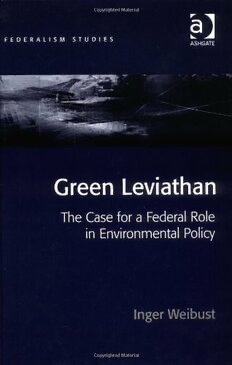
Green Leviathan (Federalism Studies) PDF
247 Pages·2009·3.272 MB·English
Most books are stored in the elastic cloud where traffic is expensive. For this reason, we have a limit on daily download.
Preview Green Leviathan (Federalism Studies)
Description:
The US, Switzerland and Canada are wealthy democracies that should be conducive to effective decentralized or cooperative environmental policy-making. However, a closer examination of their environmental policy over many decades finds no evidence that these approaches have worked. So, does it matter who does what? Can cooperation between sub-national governments protect the environment? Building on comparative case studies on air, water and fluoride pollution and making use of extensive historical material, Inger Weibust questions how governance structure affects environmental policy performance in the US, Switzerland, Canada and the European Union. Breaking new ground by studying formal and informal environmental cooperation, Weibust demonstrates that federal systems with more centralized policy-making produce stricter environmental policies and suggests that devolution and subsidiarity will lead to less environmental protection. An essential insight into the complexities of policy-making and governance structures, this book is an important contribution to the growing debates surrounding comparative federalism and multi-level governance.
See more
The list of books you might like
Most books are stored in the elastic cloud where traffic is expensive. For this reason, we have a limit on daily download.
